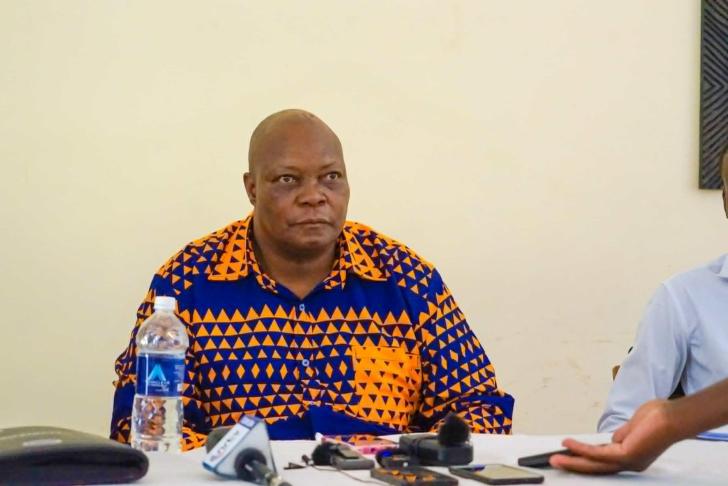News / National
Zimbabwe's covert operation targets dissent ahead of 2028 elections?
3 hrs ago | Views
As Zimbabwe's political landscape heats up in anticipation of President Emmerson Mnangagwa's potential power retention schemes, a covert operation reportedly aims to silence dissenting voices throughout the country. Exclusive insights from high-ranking officials in the Central Intelligence Organisation (CIO), army intelligence, and police indicate a widespread campaign targeting key opposition figures, activists, and journalists deemed as "political dissidents."
This secretive dragnet seeks to detain individuals who pose a challenge to Mnangagwa's plans to remain in power beyond the constitutionally allowed two terms, which conclude in 2028. The operation also extends to the ruling Zanu-PF party itself, aiming to identify and eliminate internal opponents ahead of the crucial congress scheduled for 2027.
"This is part of an effort to stifle growing dissent ahead of crucial leadership renewal within Zanu-PF at the 2027 congress and the subsequent elections in 2028," disclosed a source who requested anonymity.
According to the insider, a list of prominent individuals is under scrutiny, facing potential charges ranging from rape and murder to treason. Notable targets reportedly include members of the opposition Citizens Coalition for Change (CCC), a party that has gained considerable support in urban and rural areas alike.
Among those mentioned is former Mkoba MP Amos Chibaya, currently in remand prison for allegedly inciting violence. Other high-profile figures reportedly on the government's radar include Tendai Biti, a vocal lawyer known for his critiques of the government, and Joana Mamombe, a young opposition MP who has been an advocate for human rights reforms.
Job Sikhala, a well-known defender of civil liberties who has frequently opposed government actions, is also reportedly under surveillance. His previous detentions have attracted international attention, suggesting a renewed effort to silence his activism.
The crackdown reportedly extends beyond Zimbabwe's borders, particularly targeting activists in the United Kingdom who have organized protests against Mnangagwa's regime. Names such as Munyaradzi Boniface Zengeni and Brian Chikukwa, alongside a growing list of others, have surfaced as part of this operation.
In addition to established activists, several student leaders, including Takudzwa Ngadziore from the University of Zimbabwe, have been identified as key instigators of anti-government protests.
As the government escalates its clampdown on dissent, there are rising fears that these arrests could mark the onset of a more extensive campaign to dismantle opposition ahead of the 2028 elections. Observers note that this operation bears resemblance to tactics employed by past regimes, using state machinery to suppress political competition and silence critical voices.
Opposition parties and civil society organizations have condemned the targeting of political figures as an abuse of state power and a direct violation of democratic principles. A CCC activist stated, "This is a blatant attempt to muzzle the opposition and scare citizens into submission."
Mnangagwa has consistently denied allegations of suppressing opposition voices, asserting that the government is merely enforcing law and order. However, with the political climate growing increasingly tense, observers are apprehensive that Zimbabwe may be on the brink of a new wave of authoritarianism.
This secretive dragnet seeks to detain individuals who pose a challenge to Mnangagwa's plans to remain in power beyond the constitutionally allowed two terms, which conclude in 2028. The operation also extends to the ruling Zanu-PF party itself, aiming to identify and eliminate internal opponents ahead of the crucial congress scheduled for 2027.
"This is part of an effort to stifle growing dissent ahead of crucial leadership renewal within Zanu-PF at the 2027 congress and the subsequent elections in 2028," disclosed a source who requested anonymity.
According to the insider, a list of prominent individuals is under scrutiny, facing potential charges ranging from rape and murder to treason. Notable targets reportedly include members of the opposition Citizens Coalition for Change (CCC), a party that has gained considerable support in urban and rural areas alike.
Among those mentioned is former Mkoba MP Amos Chibaya, currently in remand prison for allegedly inciting violence. Other high-profile figures reportedly on the government's radar include Tendai Biti, a vocal lawyer known for his critiques of the government, and Joana Mamombe, a young opposition MP who has been an advocate for human rights reforms.
Job Sikhala, a well-known defender of civil liberties who has frequently opposed government actions, is also reportedly under surveillance. His previous detentions have attracted international attention, suggesting a renewed effort to silence his activism.
The crackdown reportedly extends beyond Zimbabwe's borders, particularly targeting activists in the United Kingdom who have organized protests against Mnangagwa's regime. Names such as Munyaradzi Boniface Zengeni and Brian Chikukwa, alongside a growing list of others, have surfaced as part of this operation.
In addition to established activists, several student leaders, including Takudzwa Ngadziore from the University of Zimbabwe, have been identified as key instigators of anti-government protests.
As the government escalates its clampdown on dissent, there are rising fears that these arrests could mark the onset of a more extensive campaign to dismantle opposition ahead of the 2028 elections. Observers note that this operation bears resemblance to tactics employed by past regimes, using state machinery to suppress political competition and silence critical voices.
Opposition parties and civil society organizations have condemned the targeting of political figures as an abuse of state power and a direct violation of democratic principles. A CCC activist stated, "This is a blatant attempt to muzzle the opposition and scare citizens into submission."
Mnangagwa has consistently denied allegations of suppressing opposition voices, asserting that the government is merely enforcing law and order. However, with the political climate growing increasingly tense, observers are apprehensive that Zimbabwe may be on the brink of a new wave of authoritarianism.
Source - NewZimbabwe














































